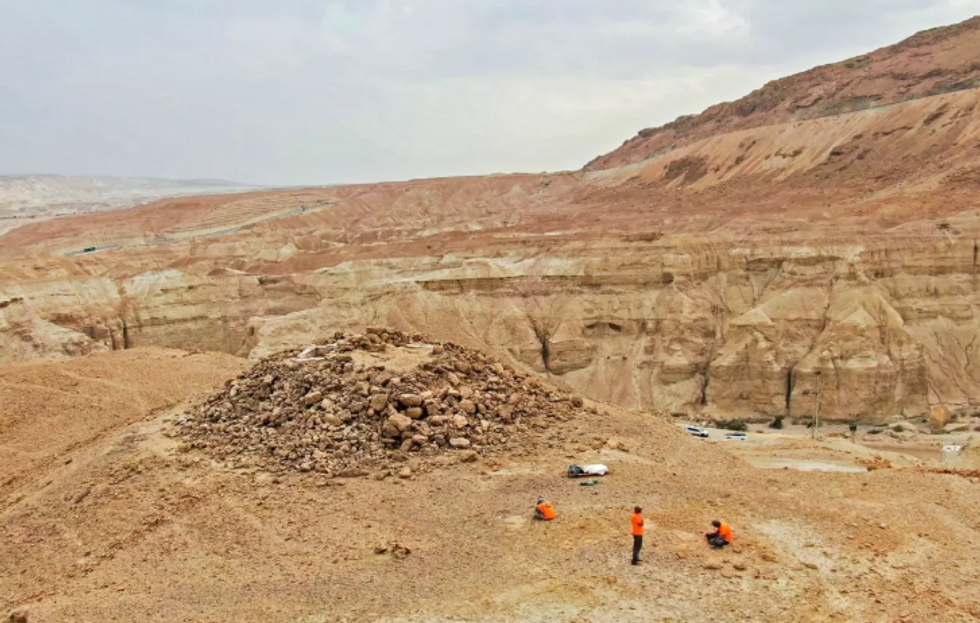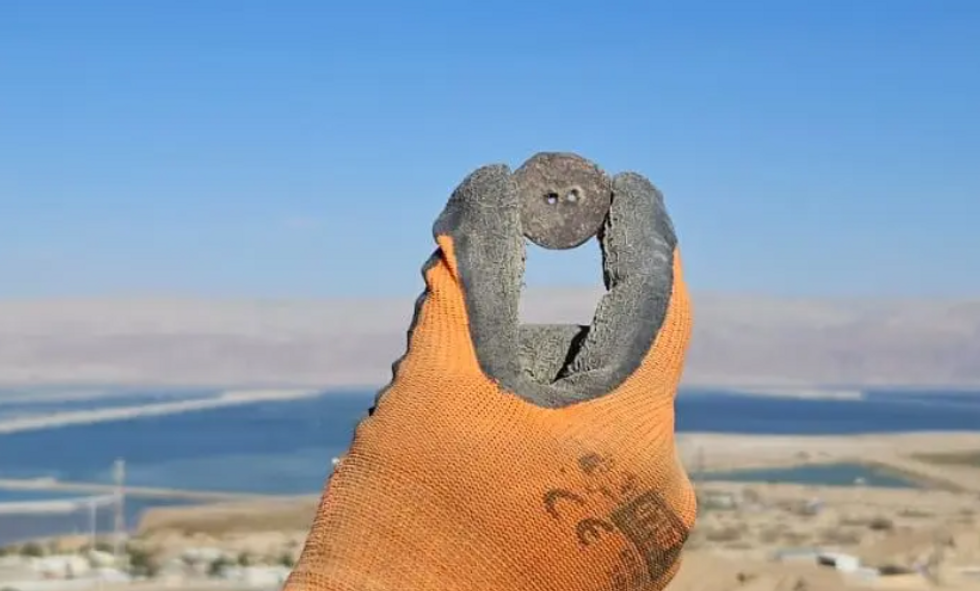Eliana Silver
Guest Reporter
Archaeologists in the Judean Desert have unearthed a "mysterious pyramid-shaped structure" dating back 2,200 years filled with coins and weapons.
The discovery was made during a joint mission between the Israel Antiquities Authority (IAA) and the Ministry of Heritage excavation.
The ancient structure dates to the Hellenistic period when the Ptolemies and Seleucids ruled Israel.
The site is located approximately 800 metres above the Dead Sea in a rocky desert landscape characterised by numerous wadis cutting through the stone.

The structure is constructed from hand-hewn stones, with each stone weighing hundreds of pounds.
"What we have here is one of the richest and most intriguing archaeological excavations ever found in the Judean Desert," said IAA excavation directors Matan Toledano, Dr. Eitan Klein and Amir Ganor.
Experts remain uncertain about the building's purpose.
"We still do not know for certain what the building's purpose was," the excavation directors explained.
MORE LIKE THIS:
The structure could have served as a guard tower, a grave marker or possibly an ancient monument.
"It is an enthralling historical mystery," the directors said in a press release.
The excavation also yielded bronze coins related to Ptolemies and of Antiochus IV. Weapons, wooden tools and fabrics were discovered at the site.
Historical documents, bronze vessels and remains of ancient furniture were also found.

The ancient find has provided new information that changes the site's historical record.
"Contrary to previous hypotheses that attributed this structure to the First Temple period, it seems that it was built later during the Hellenistic period when the land of Israel was under Ptolemaic rule," said the release.
The excavation has significantly altered understanding of the site's history and challenges previous assumptions about the structure's age.
"The discoveries are exciting and even emotional, and their significance for archaeological and historical research is enormous," said IAA Director Eli Escusido.
Escusido further emphasised the importance of the project, stating: "The Judean Desert survey is one of the most important archaeological operations ever undertaken in the State of Israel's history."
Find Out More...
The discovery was made during a joint mission between the Israel Antiquities Authority (IAA) and the Ministry of Heritage excavation.
The ancient structure dates to the Hellenistic period when the Ptolemies and Seleucids ruled Israel.
The site is located approximately 800 metres above the Dead Sea in a rocky desert landscape characterised by numerous wadis cutting through the stone.

The structure is constructed from hand-hewn stones, with each stone weighing hundreds of pounds.
"What we have here is one of the richest and most intriguing archaeological excavations ever found in the Judean Desert," said IAA excavation directors Matan Toledano, Dr. Eitan Klein and Amir Ganor.
Experts remain uncertain about the building's purpose.
"We still do not know for certain what the building's purpose was," the excavation directors explained.
MORE LIKE THIS:
- Archaeology breakthrough as iron age hoard could rewrite history of life in Britain 2,000 years ago
- Archaeology breakthrough as scientists uncover long lost ancient society in Africa
- Archaeology discovery as scientists may have found 'true purpose' behind Stonehenge existence
The structure could have served as a guard tower, a grave marker or possibly an ancient monument.
"It is an enthralling historical mystery," the directors said in a press release.
The excavation also yielded bronze coins related to Ptolemies and of Antiochus IV. Weapons, wooden tools and fabrics were discovered at the site.
Historical documents, bronze vessels and remains of ancient furniture were also found.

The ancient find has provided new information that changes the site's historical record.
"Contrary to previous hypotheses that attributed this structure to the First Temple period, it seems that it was built later during the Hellenistic period when the land of Israel was under Ptolemaic rule," said the release.
The excavation has significantly altered understanding of the site's history and challenges previous assumptions about the structure's age.
"The discoveries are exciting and even emotional, and their significance for archaeological and historical research is enormous," said IAA Director Eli Escusido.
Escusido further emphasised the importance of the project, stating: "The Judean Desert survey is one of the most important archaeological operations ever undertaken in the State of Israel's history."
Find Out More...
